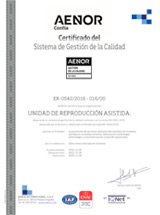Patient profile
- Unexplained implantation failure
- Poor or inadequate endometrial development
- Asherman syndrome
- History of uterine interventions on endometrium: curettage, hysteroscopies…

Its usefulness in refractory endometrium and implantation failures For a correct embryo implantation, we not only need embryos of optimum quality but also an adequate endometrial preparation.
There are patients in whom getting an adequate growth of endometrium is not easy.
Until now, we had different strategies designed to help us with an adequate endometrial growth such as Adiro, pentoxifylline, sildenafil, estrogens at high doses, etc. but there are still some cases in which the endometrium is refractory to all these treatments.
It is precisely for these cases, both refractory endometrium and implantation failure, where treatment with PRP (Platelet Rich Plasma) has proven its usefulness.
With this simple therapy in which the patient’s own blood is used, we achieve better growth of the endometrium and an improvement in embryo implantation rates.
Platelet-rich plasma is applied directly into the endometrium. Inoculations are performed during the period of endometrial preparation for embryo transfer. It is administered through an embryo transfer cannula through the cervix in the consultation and it does not require prior preparation, anesthesia, or subsequent rest.
This fraction of plasma is rich in different substances that contribute to angiogenesis and tissue regeneration and improve the receptivity conditions of the endometrium. As we use patient’s own plasma, there are practically no contraindications to the process.




